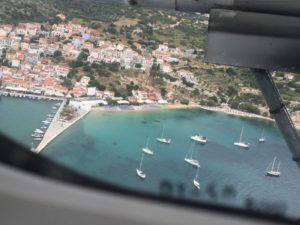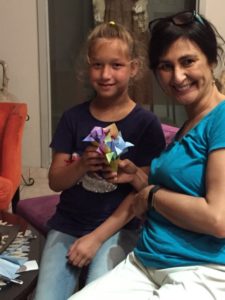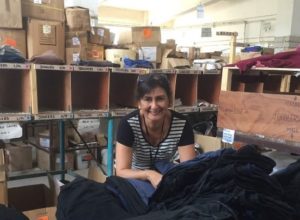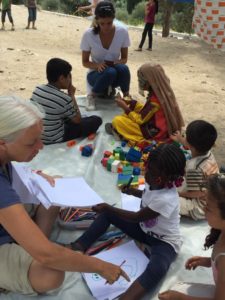Laurette Bennhold-Samaan in Samos, Greece: Working with Refugees
Laurette Bennhold-Samaan started working at the Peace Corps in 1995 as the first Cross-Cultural Specialist with the Peace Corps and pioneered mandatory state-of-the-art cross-cultural training for all Volunteers and Staff in more than 90 countries. After her Peace Corps years, she went to work for the World Bank, and then for several cross-cultural firms until very recently when she found herself out-of-work. This is Laurette’s very new blog that is telling us what she is doing now, and I thought you might all find it interesting. Note: JC
Your job is over…. But your work has just begun
Hearing the words, “your job is over” from my current employer went over like a lead balloon. Then, after 3 long and arduous months of job searching, I realized that I needed to change directions. I needed to take advantage of the time “off” in between jobs and do something that I have always wanted to do but never had the courage to explore. How could I take a month off of my life and go and serve out of my comfort zone? How could I not?
“Opportunities multiply as they are seized; they die when neglected. Life is a long line of opportunities.” — John Wicker
It was the first time in my life that I could remember when I wasn’t in school, didn’t have a job nor didn’t have caregiving responsibilities. There was this continuous nagging in my head, Laurette, NOW is the time to seize an opportunity. Once I made this mental mind shift which took some inner work and exploration, the looming task of where was I going to go and what in the world could I offer?
I did have some parameters. I wanted to go back overseas and serve in some capacity. I only had a few months as I really do need an income. I wanted to be on the front lines working with people in need. The possibilities were endless and the exploration easy with the internet. According to the UN refugee agency, 65.3 million people are currently displaced from their homes. Among them, about 21.3 million are refugees under the age of 18 years old separated from their parents or have lost their parents. One in every 113 people is now either an asylum seeker, internally displaced or a refugee. My mind kept returning to refugees. We don’t choose where we are born, to whom we are born, what passport we hold nor the political turmoil and unrest that happens.
I found an organization on-line which sounded ideal for me- socially oriented (not medically nor legally oriented as I don’t have those qualifications) and I filled out the application with excitement. I decided to wait and see if I got accepted before I would try to use my network to ensure it was real! Weeks later I got accepted and luckily through friends of friends of friends I spoke to a woman who had recently returned from Samos! How lucky was that? As she shared her story by phone I pressed “accept assignment” on-line! I was really going to Samos, Greek for a month. My mind raced with all of the preparations that I needed to complete with the anticipation of being gone for a month. Granted it wasn’t a year and “just” a month but I had never done something like this before at this stage of my life. My heart pitter-pattered a bit faster and my excitement and nerves mounted.
Samaan arrives in Samos, Samos
As I sit on the plane feeling a bit numb and exhausted, I realize that I don’t have strong expectations of what I will find as it will be all new to me. What will I really be doing? With whom would I be interacting? Can I make my way around town not speaking Greek nor reading the street signs? Will there even be street signs? What will the refugees be like? Will I be able to talk to them? In what language? What will our conversation topics be? I have zero answers to all of these questions so all I can do is to be patient (and sleep :)) and it will all unfold in due time.
After multiple flights (with delays of course), I land at the small Samos airport which feels old and doesn’t feel like an airport; no guards, no controls, one belt to receive luggage, all signs in Greek, Greek women totally in black (a tradition once their husbands pass away) and it is a rare gloomy, cloudy day. Of course, I have to go to the bathroom and find my way to a sign that says WC (at least I know what that means!)- I walk in and see 4 stalls. Much to my surprise a man walks out of one of them and I quickly assume that I had walked into the men’s room. As I start to walk out, in walks a woman and it was at that moment that I realize it is co-ed and physical resource conservation. Now it’s time to figure out how I get my 2 very large suitcases off the belt and outside to a cab. I pray there will be cabs. No luggage people in sight but a broken down cart in the corner- yay! I grab it. It is standing next to an obvious priest or bishop in a long black gown, distinctive black hat, long white beard and a large silver cross hangs across his chest.
I quickly find one of the 3 cabs waiting outside and hop in! As I get into the cab so does the driver and 3 children. We start driving. Who are these kids? His kids? There is lively Greek conversation in the cab as I turn to one of the children and ask her very slowly if she speaks English. Her eyes get big, her smile wide and her cheeks rosy as I could tell she is embarrassed. She laughs and never speaks a word the rest of the way- in English nor in Greek! Before I left the US I knew that I needed overseas health insurance but as the cab driver accelerated down the narrow streets and steep hills, I realize that I might need life insurance more than health insurance! What a ride both literally and figuratively! I also had heard numerous stories that while some local Greeks welcome the refugees not all do. Guess that is similar in all cultures. I, of course, feel like it is out of fear but I am sure there are many opinions on that. Normally, I start a conversation with a cab driver but my stomach is in my throat due to the car speed that I can’t get a word out! I arrive at my hotel in one piece feeling like I have just gotten off a ride at the fair. The view is stunning and due to the ride I am left speechless.
My hotel is in the center of town and while it is simple, it’s perfect for me. My favorite part is that there are many ”vulnerable families” (pregnant moms, families with many children etc..) at my hotel. These families are sponsored by other agencies and do not live at the camp but we provide services to them as well. The kids often times hang out in the lobby which I welcome. They vary in age but often times you have a 9-year-old watching 3 or 4 siblings and one who is under a year. Very cultural. I know that I need to delicately balance them getting to know me and then I disappear which has already happened too often in their life. We are advised to refer to our departure often so they know it will happen. That night, as I am folding origami with them they are building boats and labeling them as good or bad and role playing some disappearing. The thought of what they are really saying still gives me a pit in my stomach. What these children experienced is beyond words and yet there they sit folding paper and playing with me. They love to take photos with silly faces using my phone and they even show me a few phone tricks that I didn’t know. The refugees come from ALL social classes. They also all make a point of showing me their “new” (donated) shoes which I feel somehow, for some of them, helps ground them.
At 10:30 pm I ask them if they are ready to go to bed soon. They reply that they are going to the park at which point I chuckle at 10:30 pm? Minutes later, their parents appear and all 7 of them are off to the park. Cultural differences again!
On boarding and Going to the Refugee Camp for the first time
I would rather feel compassion than know the meaning of it.
-Thomas Aquinas
https://www.facebook.com/samosvolunteers/?hc_ref=SEARCH
Samos Volunteers are an amazing organization that fills an essential void for the refugees. There are many NGO’s and international organizations with whom they partner (Medic, Save the Children, Medecins Sans Frontieres, Boat Refugee Foundation etc.) but none fill the social void these children and families have. The refugees arrive by dinghies in the middle of the night (safer to not be caught) and the typical less than 2-hour boat ride from Turkey can last anywhere from 4–10 hours as they need to take the longer less direct routes to not get caught by the Turkish coast guard. They try to use satellite navigation but they don’t really know which beach they will end up on in Greece. The local coast guard might spot them or they land and a local will spot them and call the Police. The police then call Samos Volunteers (US!!) who will come in the middle of the night to supply dry clothes, blankets, food, and water. They might not have had food or water in days depending on when they left. In the morning the other NGO’s and local authorities take over to get them police identification papers. They are then brought to the camp and either put in tents or barracks as this refugee camp was an old military site. Last week 300 arrived by dinghies. Yes, you read that number correctly. Just think of the coordination that goes into that! Not even a former COO can fathom all of those steps!!
The majority of refugees who arrive in Samos have experienced violent conflict. While we are not here to provide any sort of medical, legal, or psychological support, we empower and stimulate the refugees through our work and activities at the camp which including playing with the children, teaching English, German, Greek and French through Farsi, Arabic, Kurdish and Sorani, doing arts and crafts, music lessons and any other skills volunteers come with!
Living conditions at the camp are extremely basic, unsanitary and can be shocking for some; there can be shortages of both water and electricity and the majority of refugees are surviving on camp rations. Some of the refugees have been here over a year. Imagine no school, no work, and nothing to do but wait under such living conditions. If their papers are processed positively for asylum or family reunification they are the fortunate ones. The others might get a denial (they have no legal representation) of which they can appeal but after a second appeal (decided by a single judge) they are deported.
The Samos refugee camp (an operation funded by the United Nations Refugee Agency and Samaritan’s Purse) is an open one which means that they are allowed to leave and go around the island. Some have broken the boredom cycle by playing music with a local Greek band and others have become cultural and community liaisons for Samos volunteers. Before I came, I thought that the refugees would be so traumatized by their past and many are, but ALL are much more stressed about their future. It is so uncertain.
At the camp on my first day, I served tea. Twice a day we serve tea to the refugees. It is quite a moving experience for me to look into their eyes and wonder about their past and future. I’m sure they’ve experienced and witnessed more than many of us will have in a lifetime. Many of them speak Arabic and the few words I know I am able to at least show my willingness to try to communicate. Most smile at my miserable attempt. 🙂
Sunday-the day of rest.
I rent a car (only stick shift) today with another volunteer and we drive to the darling, picturesque neighboring town of Kokari.
Coming home after dropping off other volunteers is an adventure and the streets are SO narrow that at one point the turn is so narrow I give up and started backing down the street. In true genuine Greek hospitality a man comes out of his house, motions to me to leave the car and takes over driving around the narrowest corner I have ever seen (ok there was 4 inches on either side of the car!!) Of course, many of the neighbors are peeking through their lovely lace curtains!!!
Full work day with joys and sorrows
Every evening we are given a schedule for the following day. The situation here varies and is so fluid that we cannot plan more than 24 hours in advance. We never know when boats are going to arrive and we never know where the need will be. Today I begin by working at the warehouse. The warehouse is the place where massive donations are received, from all over the world, and we sort out packages of sweat pants, T-shirts, socks and shoes which are given to those arriving by boat.
After lunch, I go to the camp to play with the children ages 5–12 years. The sun is hot and we sit under a shaded olive tree and play various games or stand on uneven dirt ground doing activities such as jumping rope or swinging. The children vary in language ability and level of play interaction. Some have a challenge of playing with others, sharing and appear distraught. Others seem to be in the moment having fun and being a child. I draw with some kids today and their pictures usually tell something significant about their story. Wish I were an art therapist.
Some speak a few words of English and others none at all. Sometimes a nod, a smile, a hug or an offer for water are all they are looking for. As we are drawing I somehow felt the tension in the air and look on the street and see at least 20 police. I don’t understand what is happening and somehow wonder if it is a bomb threat given what is happening elsewhere in the world. I then feel the earth move and wonder what the police have done. I later learn it was a 6.3 earthquake in Izmir Turkey and the multiple police were arresting someone who had lost their second appeal and
I later learn it was a 6.3 earthquake in Izmir Turkey and the multiple police were arresting someone who had lost their second appeal and was being taken to the deportation center. On the way home, my rented car makes squealing noises which I barely notice until the belt breaks, but my mind and my heart are elsewhere. I cannot get the picture out of my head, nor the tears out of my eyes, of the Syrian refugee who I had served tea to the day before, being arrested by the police and deported from the island and a chance at a new life.





An uplifting narration, despite the sad circumstances. Thank you, Laurette; thank you, John.